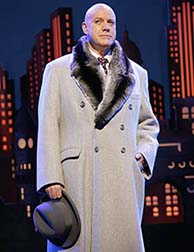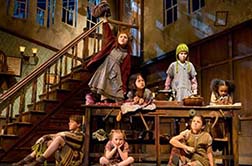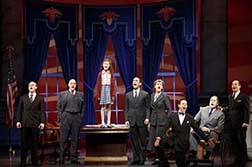|
Musical “Annie”
is Thomas Meehan’s assault on the cartoonist’s rightwing
polemics.
“Annie”
Book by Thomas Meehan, lyrics by Martin Charnin, music by Charles
Strouse.
Based on the comic strip “Little Orphan Annie” by Harold
Gray.
Palace Theatre, 1564 Broadway, New York City.
(877) 250–2929. http://www.anniethemusical.com/.
Opened Nov 8, 2012; closes Jan 5, 2014.
Reviewed by Lucy Komisar Nov 15, 2012
 |
| Anthony Warlow as Oliver
Warbucks, photo by Joan Marcus. |
I’ve noticed for years that major theater critics often review
political plays without mentioning their politics. In an egregious
example, some years ago the New York Times critic wrote about Arthur
Miller’s “The American Clock,” about the Depression,
without noting that it was powerfully anti-capitalist. As it’s
a political season now — when isn’t it? — I thought
it worthwhile to look at the similarly ignored back-story politics
of a current hit.
It’s “Annie,” based on the “Little Orphan
Annie” comic strip created by Harold Gray in 1924. Gray attacked
income taxes, labor unions and welfare programs. He is cited in the
Boston Globe as saying “I . . . have despised Roosevelt and
his socialist, or creeping communist, policies since 1932, and said
so in my stuff, so far as I was allowed to do so. I despise Truman’s
efforts to carry on the socialization and eventual communizing of
this country. I hate professional do-gooders with other people’s
money.”
The “Annie” comic strip was a reactionary screed. It
grew livid in the 1930s when Franklin D. Roosevelt was president.
Oliver Warbucks was an obvious hero for Gray. Just think of the name.
He gets his bucks from war profiteering. And that’s supposed
to be a good thing. In the strip, it turns out he owned a machine
tool shop and got rich producing munitions for the military during
World War I. Now one of the 1%, he wears a fur-trimmed coat over a
tuxedo and diamond stickpin.
Aside from Katie Finneran’s smashing portrayal of the nasty
orphanage overseer (Gray’s attack on social welfare), the best
thing about the play is the back-story about how book writer Thomas
Meehan turned a right-wing, anti-union story by a conservative free-enterpriser
who hated Roosevelt into a pro-New Deal musical where FDR has a cameo
role.
I thought “Annie” was hokey, not terribly imaginative,
certainly slight compared to that other little-girl play, “Matilda.”
(Annie makes it by being taken up by a rich guy; Matilda succeeds
on her own ingenuity and guts.) At first I was surprised about the
corny narrative. The only thing realistic about the musical’s
Oliver Warbucks (Anthony Warlow) is that he has his staff look for
a Christmas orphan as a public relations ploy.
But Meehan has progressive politics. He wrote the book of “Hairspray,”
the powerful civil right musical that ran from 2002 to 2008 and picked
up eight Tonys. (He also wrote “The Producers.”)
 |
| Lilla
Crawford as Annie, and the orphans, photo by Joan Marcus. |
It’s December 1933, the depths of the Depression, at the New
York City Municipal Orphanage. The parents of eleven-year old Annie
(Lilla Crawford) had left her as an infant with a note asking she
be taken care of.
Annie hides in a laundry basket to escape the orphanage, which is
run by the mean and alcoholic Miss Hannigan (Finneran).
Annie comes upon a Hooverville, a shanty town of shacks at the East
River, underneath the 59th Street Bridge. The inhabitants express
a lot of sarcasm, of the sort Meehan but not Gray would convey. A
man declares, “I need some more wood, for the penthouse.”
An apple seller says, “Make way for John D. Rockefeller.”
And they sing: “We’d like to thank you, Herbert Hoover
For really showing us the way
We’d like to thank you, Herbert Hoover
He made us what we are today.
Prosperity was ’round the corner
The cozy cottage built for two
In this blue heaven that you gave us
Yes! We’re turning blue!
James Lapine’s direction is good in bringing out the real misery
and anger of the those homeless people. The scene reminded me of the
“Merry Christmas, Maggie Thatcher” song in Elton John/Lee
Hall’s “Billy Elliot.” The police break up the Hooverville
the way they attacked the striking miners in “Billy Elliot.”
Back at the mansion, at 987 Fifth Avenue (it would be just south of
East 80th Street), Warbucks has an English butler, a pair of French
maids, a housekeeper, a cook, and four man-servants.
Grace Farrell (Brynn O’Malley), his private secretary, tells
him that President Roosevelt (Merwin Foard) “wants you to call
him at the White House.” Now that’s pretty odd. And she
reminds him, “Remember, sir, your public relations people advised
you to invite an orphan here for Christmas so as to soften your public
image.”
Financier Bernard Baruch calls and Warbucks tells him, “Barney,
your pal Roosevelt has got to do something drastic. He’s got
to come up with a new approach, a new plan, a new…” Hmmm.
 |
| Lilla
Crawford as Annie, and FDR (Merwin Foard) and his cabine, photo
by Joan Marcus |
Warbucks talks on the phone to Roosevelt, alluding to his hostility,
and says, “Listen, Mister President, why don’t we bury
the hatchet and you come for supper on Christmas Eve, on your way
to Hyde Park.”
Segue to the Cabinet Room at the White House. Warbucks and Annie show
up. Labor Secretary Perkins declares that there are fifteen million
out of work and nearly fifty million, a whopping forty percent of
the country, with no visible means of support.
So Annie stands up and sings “The sun’ll come out tomorrow.”
FDR gets his Interior Secretary Ickes to sing. OK, I thought that
a little ridiculous, but this is a cartoon.
But then, when Warbucks and Annie leave, it gets real. Fascinating
how Meehan segued into this.
Ickes says, “Mr. President, what if we set up a hundred –
no, a thousand new Federal projects?
Perkins says, “Dams!”
Hull says, “Highways!”
Morgenthau says, “New Post Offices!”
And Ickes declares, “Yes. And put the unemployed to work building
them.”
Perkins: “We could create five million new jobs within six months.”
Howe: “And weekly pay checks would get all of those millions
off relief and back to paying taxes.”
Ickes says, “Mr. President, what we’ve got to give this
country is nothing less than a new… outlook.”
Perkins: “A new… vision.”
Hull: “A new approach.”
Morgenthau, “A new concept.”
Roosevelt declares, “A new deal!”
Warbucks’ Christmas party is pretty glitzy, with servants and
all. But when FDR shows up, Warbucks sings, “I know the
depression’s depressing…. But we’ll get a new deal
for Christmas this year! …..Santa’s got brand new assistants/
There’s nothing to fear/ They’re bringing a new deal for
Christmas/ This year.”
He adds, “Those happy days that we were promised…
And Roosevelt says, “Are finally here!”
Remember that FDR’s theme song was “Happy Days are here
again.”
The cast wraps it up: “We’re getting a new deal for Christmas
this year!”
Harold Gray died a multi-millionaire in 1968, the year of the apogee
of international left-wing activism. If one accepts the metaphor,
Harold Gray would be turning over in his grave. Bah, humbug! A New
Deal, indeed!
The Harold Gray quote was cited by comics historian Jeet Heer.
Visit Lucy Komisar’s website http://thekomisarscoop.com
|




